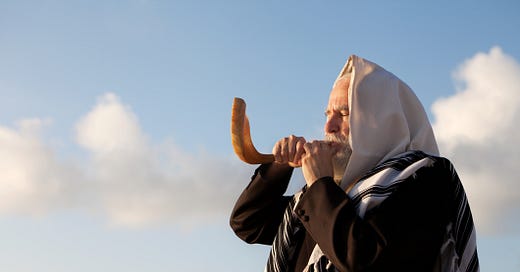Today is Rosh Hashanah, the Jewish New Year 5783 and the beginning of a ten-day period of reflection called the Days of Awe. This period leads up to Yom Kippur, or the Day of Atonement, which in Judaism is the holiest day of the year.
The Jewish High Holidays are like God’s way of saying, “You and I need to talk.” No pushing away the things that are the most real, the most relevant - particularly those that are most difficult to look at. No ignoring inconvenient truths. No failing to own up to our personal faults. During the Days of Awe, we come clean with God.
The “observant Jew” is not just someone who observes the religious rituals of Judaism, but someone who observes His internal commandments. It’s not just about the food on our table or the wine we drink or our trips to the synagogue; it’s about the thoughts in our minds and the purification of our hearts. On Yom Kippur we’re expected to get real, to atone for our transgressions, and commit to being the people God created us to be in the year that lies ahead.
When I was a child I remember the High Holidays were a big thing in our family. We made the yearly pilgrimage to Congregation Beth Yeshurun in Houston to observe Rosh Hashanah, and then ten days later Yom Kippur. I remember laughing at my mother’s Yiddish when she said “Gut yontif” with a Southern drawl. Those seem now like very innocent times. No one would have thought then that perhaps an armed guard should be posted near the door.
Today, however, things are different. Global antisemitism, including in the United States, is on the rise. Violent acts against Jews are increasing, as antisemitic attacks in New York and elsewhere are at their highest levels in decades. The rise is often attributed to the conflict between Israel and Palestine. While people on the American Right are apt to support Israel at the expense of appropriate and just concern for the human rights of the Palestinians, people on the Left are apt to support justice for Palestinians at the expense of just concern for the security of Israel. One thing I will say about actually having visited Israel and Palestine quite a few times: in that part of the world, people recognize that the conflict is complicated and heartbreaking, not simplistic and black-and-white. The situation involves tragic and unprocessed trauma on both sides, a subject I have written about before.
No matter what someone thinks about the politics of Israel - and criticism of its policies is totally legitimate - those criticisms should not be used as cover for old-fashioned antisemitic tropes. Yet that is what’s happening. David Baddiel’s book Jews Don’t Count explores how at a time when so much religious and cultural prejudice is rightfully challenged, antisemitism gets a pass from many who are usually so concerned about racism and bigotry. To some of us, that’s chilling.
A characteristic shared by Judaism and Islam, yet uniquely different than Christianity, is that our theology is intermixed with the history of our people. Standing up for each other is one of the ways we stand up for God. So this year, in committing ourselves to God, in asking that our hearts be purified, in atoning for our sins and committing to being the people God would have us be, we are rightfully aware of our commitment not only to Him but to those who share our religion. Dark clouds of antisemitic tropes have turned into tragic, deadly forces unleashed against us before - less than a hundred years ago. It isn’t funny and we must never forget.
Make no mistake about it: the neofascism gaining ground in the world today, including here in the United States, considers Jews a number one target. Crowds in Charlottesville (you remember, those “good people on both sides”?) chanted the old trope “Jews shall not replace us.” Swastikas are seen on flags at political rallies and painted as graffiti on the sides of synagogues. The new prime minister of Italy, Georgia Meloni, says that “Mussolini was a good politician. Everything he did, he did for Italy,” when in fact Mussolini sent over 7,000 Italian Jews to their deaths at Auschwitz.
Regardless of our tribal or religious identity, we should remember these words of Martin Luther King, Jr.: “Injustice anywhere is a threat to justice everywhere.” All of us need to learn more truth and leave fewer lies unchallenged. Educating ourselves about racism and bigotry - wherever it exists - is important, and standing up to hate wherever we see or hear it, is important. A little bit of antisemitism is like a little bit of cancer. Do everything possible to make sure it doesn’t spread.




A deeply moving message that encourages us to open our hearts to our brothers and sisters, as an antidote to the divide and conquer manipulation of the rulers of our world.
Thank you for stating this complex issue so simply and plainly. The rise of neo-fascism in the USA… and throughout the West… is deeply troubling… and way too many people don’t understand the danger of nationalistic rhetoric, which they confuse with patriotism. The more this continues, the easier it becomes for people to “demonize” the “other,” at which point acts of inhumanity actually seem justifiable to those with a tribal mentality. I thought we had evolved past this, but we have a long way to go and a lot of work to do.